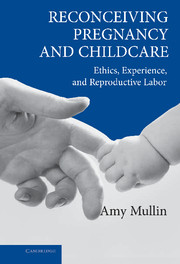3 - The Ethical Significance of Pregnancy
Published online by Cambridge University Press: 05 June 2012
Summary
INTRODUCTION
By now I have given an account of some misconceptions of pregnancy found in lay and academic culture, in chapter 1, and provided a corrective account of women's embodied experiences of pregnancy in chapter 2. This second chapter stressed both the planning and purposes that can guide pregnant women, and the accommodations they must make to features outside their control. In neither chapter did I focus attention on the relationship between a pregnant woman and the fetus inside her. I turn now to this relationship, which must be considered in its social context, as I ask about the ethical significance of pregnancy. In speaking of ethical significance, I mean to indicate anything that is relevant to practices of moral evaluation and moral judgment.
While many aspects of pregnancy have been ignored by philosophers, ethical questions about it garner considerable attention. However, most of this attention has been focused on situations where women and fetuses are posited as adversaries: either where abortion is considered or chosen or when pregnant women engage in behavior that harms fetuses. Ethical questions about pregnancy tend to be presented as questions about whether women are morally justified when they make decisions without taking into consideration the welfare of their fetuses. As feminist philosophers Vangie Bergum, Eugenie Gatens-Robinson and Catriona Mackenzie, demonstrate, this is not how most women think about abortion.
- Type
- Chapter
- Information
- Reconceiving Pregnancy and ChildcareEthics, Experience, and Reproductive Labor, pp. 72 - 105Publisher: Cambridge University PressPrint publication year: 2005



